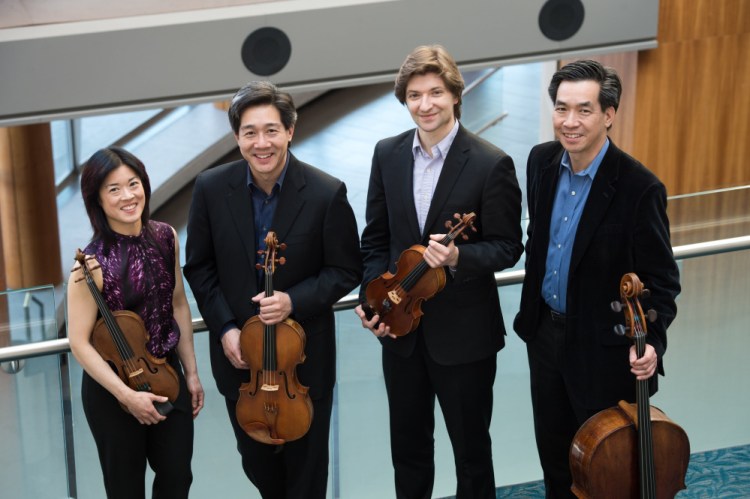BRUNSWICK — Maine’s temperate summers have long been a lure for musicians around the country, but for a concentration of starry players and programming variety, it’s hard to top the Bowdoin International Music Festival, which got underway last week. As always, the festival is offering a tightly packed schedule of recitals, chamber concerts, master classes and lectures, as well as performances by students who come to the festival to study with the roster of accomplished artists the festival attracts – 175 events in all, this year.
Since the end of 2014, the festival has been directed by violist Philip Ying and cellist David Ying, brothers who make up half of the excellent Ying Quartet (along with violinists Robin Scott and Janet Ying). On Monday evening, the quartet played a program of lush, Romantic works – a youthful Mendelssohn quartet, comparative rarities by Puccini and Wolf, composers not generally associated with chamber music, and a quintet by Dvorák.
To an extent, this repertory, and the tradition of sumptuousness it represents, are the Ying Quartet’s strongest calling card, something that was evident from the opening bars of Mendelssohn’s String Quartet No. 1 (Op. 12), when the ensemble’s thoroughly unified, carefully balanced, rich sound left you with the sense that, though the music could be played differently with equal impact, it could not be played with greater warmth or depth.
The work itself is a delight, completed when Mendelssohn was 20, and with several sections – the fleet, tuneful Canzonetta movement and passages in the finale – recalling the transparent, sprightly and remarkably lithe music (the “Midsummer Night’s Dream” Overture, for example) that Mendelssohn composed as a teenager. In the Canzonetta, the Yings found just the right tempo – speedy but not reckless – and brought a light touch to the movement that produced the gossamer tone it demands, with pizzicato phrase endings played with subtlety and restraint.
Puccini’s “Crisantemi” and Wolf’s “Italian Serenade” are both short works, the first an elegy for a friend of Puccini, the second an atypical burst of buoyancy for Wolf, a composer whose music (art songs, mostly) usually tends toward the melancholy. They are not quite rarities; the Wolf, particularly, turns up as a bon-bon on chamber programs, and the Puccini is sometimes played in an orchestral expansion.
But string quartets tend to ignore them, perhaps because the programming style nowadays demands big works – “statements” – and perhaps because, for quartet players, Puccini and Wolf dwell on the edge of their peripheral vision.
It would be too much to say that these are great pieces, but they have their strengths. “Crisantemi,” for example, is a deftly balanced quartet, but it also has long-lined melodies, with a distinctly Puccinian accent, that demand to be sung rather than played – and indeed, parts of the piece later ended up in “Manon Lescaut.” And the Wolf has a bright zestiness that is hard to resist. So why not end the first half of a concert with a short burst of frivolity?
The Yings, with Kurt Muroki joining them on double bass, devoted the second half of the program to Dvorák’s Quintet No. 2 in G major (Op. 77). Adding a bass to a quartet changes the ensemble’s character in some significant ways, not least by giving it a low-end kick – particularly when the bassist is playing pizzicato, but in bowed passages as well – that the cello cannot quite achieve.
Dvorak made the most of this expanded configuration, using it to bring a measure of heft to a work steeped in the Czech-accented melodies and rhythms that characterize so much of his best work. The Yings made the piece sing, and Muroki’s excellent contributions gave it a firm, solid grounding.
Allan Kozinn is a former music critic and culture writer for The New York Times who lives in Portland. He can be contacted at:
allankozinn@gmail.com
Twitter: kozinn
Send questions/comments to the editors.


